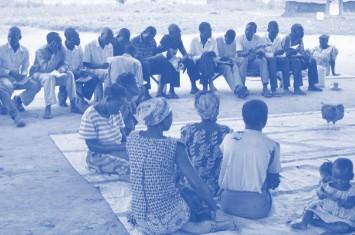POLICY BRIEF
Vers une protection renforcée des travailleur.euse.s domestiques en Tunisie : Défis et recommandations





Juin2023
Executive summary
While domestic work plays an essential role in Tunisian society, domestic workers continue to face numerous challenges and obstacles that compromise their rights and protection. This Policy Brief examines the Tunisian legal framework regarding domestic work, highlighting gaps and advancements, as well as the international instruments ratified by Tunisia. It also identifies obstacles to the effective implementation of the law and proposes concrete recommendations to strengthen the protection of domestic workers in Tunisia.
KeyHighlights:
- The Tunisian legal framework: The policy briefbegins with an analysis of the Tunisian legal framework regarding domestic work, highlighting laws and recent amendments, such as Law No. 37 of 2021, which regulates domestic work and prohibits child employment. However, some gaps remain and need to be addressed to ensure comprehensive protection for domestic workers.
- Obstacles to law enforcement: The brief identifies several specific obstacles faced by labor inspectors and social workers in accessing domestic work sites, compromising the effective implementation of the law and the protection of domestic workers. These obstacles include a lack of awareness of domestic workers' rights, fear of reprisals, and difficulties in accessing worksites.

- International instruments: The brief highlights treaties and conventions such as ILO Convention 189 on Domestic Workers and the United Nations Convention against Trafficking in Persons. It emphasizes the importance of ratifying and implementing these instruments to ensure equal rights andprotectionsfordomesticworkers.
INTRODUCTION
This policy brief presents the findings of a qualitative study conducted by ASF and its partners on the legal framework regarding the protection of domestic workers in Tunisia. The study highlights gaps and challenges in the Tunisian legal framework, analyzing existing provisions and proposing
recommendations to strengthen the protection of domestic workers. Building on the international normative framework, this policy brief underscores the importance of adopting concrete measures to ensure decent working conditions and adequate protection for domestic workers in Tunisia. The recommendations put forth will serve as abasis for an action plan to promote the effective implementation of the law and enhance the protection of domestic workers.
LEGAL PROTECTIONS FOR DOMESTIC WORK IN TUNISIA

Tunisia has adopted several laws and agreements aimed at regulating domestic work and protecting the rights of domestic workers. Law No. 65-25 concerning the situationofdomesticemployees,adoptedin 1965, establishes certain provisions regarding employer-employee relationships and sets forth rights and obligations for both parties. This law was amended and supplemented by Law 2005-32 of April 4, 2005, which raised the minimum age for employment from 14 to 16 years and strictly prohibited it under Organic Law No. 58. However, there are still gaps in the implementation of these protections.1 However, gaps persist in the implementationoftheseprotections.
One major issue in the Tunisian legal framework regarding domestic work is under-regulation. Law No. 65 does not cover all aspects of the employment relationship, such as overtime hours, sick leave, occupational sickness leave, and severance pay. Additionally, domestic workers are often excluded from protections granted to other workers, such as paid leave and social security contributions. This situation does not align with the requirements of international labor standards calling for similar social security conditionsforallworkers.
Another significant gap lies in the absence of a precise definition of domestic work in


legislation. This leads to inconsistencies in the application of protections provided by the law and may exclude certain domestic workers from these protections simply because they are not recognized as such. A clear and precise definition of domestic work would facilitate the application of existing protections and enable a better understanding of the reality of this professioninTunisia.
Furthermore, domestic workers often have limited means to enforce their rights due to their social and economic status, which limits their access to justice. Improvements are needed to ensure that domestic workers have access to dispute resolution mechanisms and accessible, affordable, and non-discriminatory judicial procedures. It is essential to strengthen the recognition of the status of victims of human trafficking by the judicial system and build the capacity of key actors to improve the handlingofhumantraffickingcases.
Tunisia has made significant progress in protecting domestic workers. However, to addressthe identified gaps,itwascrucialto revise existing legislation and take concrete measures to ensure decent working conditions, equal rights, and adequate protectionforalldomesticworkers.
To this end, Tunisia adopted Law No. 61 concerningthepreventionandrepressionof human trafficking on August 3, 2016. This law aims to protect individuals, especially women and children, against human trafficking. It contains provisions to prevent trafficking, prosecute perpetrators, protect and assist victims of human trafficking. Regarding domestic workers, Law No. 2016-61 provides provisions to protect them from all forms of exploitation, including domestic servitude, forced labor, and modern slavery. It also guarantees protective measures, assistance, and reintegration for victims, as well as criminal penaltiesforperpetrators.
1 This law provides for criminal penalties, such as imprisonment and fines, for employers who violate this prohibition, thereby strengthening the protection of children and domestic workers.Finally, Tunisia took a further step by adopting Law No. 37 in 2021, which regulates domestic work to ensure the right to decent work without discrimination and with respect for the human dignity of domestic workers. This law prohibits the employment of children as domestic workers, the exploitation of domestic workers, the violation of their rights, and the withholding of their documents. It establishes rights and obligations for employers and employees, and provides tools for investigating potential cases of domestic work, with the assistance of inspectors responsible for monitoring and inspectingworkplaces.
Despite these legislative advancements, it is crucial to continue monitoring and improving the effective implementation of these laws to protect children and domestic workers from all forms of exploitation and abuse.
OBSTACLES TO LAW ENFORCEMENT AND PROTECTION OF DOMESTIC WORKERS
This section examines the specific obstacles faced by labor inspectors and social workers in accessing workplaces where domestic servitude occurs, thereby compromising the effective enforcement of the law and the protection of domestic workers.
Unclear definition of domestic servitude
Although Law No. 37-2021 prohibits domestic servitude and refers to the sanctions provided by Law No. 61-2016 on combating human trafficking, it does not provide a clear definition of domestic servitude. The law defines slavery as a situation where all or part of the attributes of property rights are exercised over a person, including servitude, which is defined as a situation where a person is compelled to work or provide services without escape. This lack of a precise definition can compromise the identification and prosecution of perpetrators of domestic servitude, as well as the adequate



protection of domestic workers. A clear and precise definition of domestic servitude would be essential to strengthen the protection of domestic workers and facilitate the fight against this form of exploitation.
Difficulties in accessing workplaces
Labor inspectors and social workers encounter significant obstacles in accessing workplaces where domestic servitude occurs. These obstacles hinder the effective enforcement of the law and compromise the protection of domestic workers. Major challengesinclude:
a. Confidentiality and isolation of workplaces: Domestic workers perform their duties in private spaces, often secluded and away from public attention. This makes it difficult for labor inspectors and social workers to identify situations of exploitation and domestic servitude. Employers may conceal abuses and restrict accessto workplaces, making detection and interventionmorecomplex.
b. Mistrust and fear of retaliation: Due to their vulnerable status and economic dependence on their employers, domestic workers may fear reporting abuses or seeking help. Fear of retaliation, including job loss, deteriorating working conditions, or even physical violence, can discourage them from denouncing exploitative situations.
c.Lackofawarenessandinformation:Many domestic workers and employers are not fully aware of their rights and obligations underdomesticlaborlegislation.Thelackof awareness and information contributes to maintaining an environment conducive to exploitation. It is crucial to implement awareness programs and provide clear information on the rights of domestic workers and procedures for reporting abuses.
Limited number of labor inspectors and socialworkers
The limited number of labor inspectors and social workers responsible for monitoring and protecting domestic workers is another
major obstacle. This shortage of human resources makes it challenging to adequately cover all domestic workplaces and limits the frequency of inspections. As a result, many cases of exploitation may go unnoticed or not be addressed in a timely manner.
Linguistic and cultural barriers
Domestic workers, often migrants, may face linguistic and cultural barriers when interacting with labor inspectors and social workers. Limited communication can hinder the understanding of issues and potential abuses, making it difficult to assess the situation and provide appropriate assistance.
Lack of employer cooperation
Some employers may be reluctant to cooperate with labor inspectors and social workers, hindering investigations and control procedures. They may conceal evidence or deny access to workplaces, making it difficult to gather information and documentabuses.
Overcoming these obstacles is essential to strengthen law enforcement and effectively protect domestic workers from exploitation and servitude. The next section will address the recommended measures to improve access to workplaces and enhance the protectionofdomesticworkers.
RECOMMENDATIONS
ASFcallsfor:



• Ratifying and implementing international treaties and conventions related to domestic work to ensure that domestic workers have the same rights and protectionsasotherworkers.
• Establishing mechanisms to monitor and verify the implementation of national legislation in accordance with international standards set forth in the ratified treaties and conventions. Ensure that domestic workers effectively benefit from the protections and rights outlined in thesestandards.
• Amend article 22 of Law No. 37-2021 by replacing the existing provision with a new provision that authorizes labor inspectors and National Social Security Fund controllers to conduct inspections even without the employer's consent, in order to identify potential victims of trafficking,exploitation,andchildlabor.
• Establish anonymous and accessible reporting mechanisms for domestic workers, enabling them to safely report casesofdomesticservitude,trafficking,and exploitation without fear of retaliation. These mechanisms should be widely disseminated, supported by adequate resources, and ensure the confidentiality of the information provided. This will encourage potential victims to report abuses and facilitate early detection of domestic servitude situations, enabling promptandappropriateintervention.
• Establishing mechanisms to protect the rights of domestic workers, such as complaint and dispute resolution systems, to ensure their ability to report and assert theirrightssafely.
• Reporting on the implementation of ratified international treaties and conventions to relevant oversight bodies, such as submitting periodic reports to the International Labour Organization, particularlyforConvention189.
• Implementing programs to combat discrimination and ensure equal treatment of domestic workers. This may include information campaigns, as well as training for employers and domestic workersonrightsandresponsibilities.
ASF SUPPORTS ACCESS TO JUSTICE
ThispolicybriefistheresultofthecontributionofArnaudDandoy,ZeinebMrouki,and InchirahZouaoui,basedondatacollectedinastudyconductedwithconsultantFadiaKhelifi.
Avocats Sans Frontières (ASF) isaninternationalNGOspecializingin thedefenseofhumanrightsandsupportforjustice.



Editorialresponsibility:ChantalVanCutsem(140avenuedelachasse, 1040,Brussels,Belgium)
ThisstudywassupportedbyfundingfromtheUnitedStatesDepartmentofState.The opinions,findings,andconclusionsexpressedherearesolelythoseoftheauthorsanddonot necessarilyreflectthoseoftheUnitedStatesDepartmentofState.
ANNEX. KEY INTERNATIONAL LEGAL INSTRUMENTS RELATED TO DOMESTIC WORK
ILO Instruments:
**Convention No. 97 on Migrant Workers (Revised), 1949** - Sets out minimum standards for the protection of migrant workers, including domestic workers, regarding work permits, regulation of placement agencies, protection against discrimination, and social protection.
**Convention No. 143 on Migrant Workers (Supplementary Provisions), 1975** - Supplements Convention No. 97 by strengthening provisions for the protection of migrant workers and providing measures to assist migrant workers in settling in their host country.
**Convention No. 156 on Workers with Family Responsibilities, 1981** - Sets out minimum standards to protect domestic workers, as well as other workers with family responsibilities, against discrimination and ensure their right to adequate time for family care.
**Convention No. 181 on Private Employment Agencies, 1997** - Provides minimum standards for regulating private employment agencies and ensuring that domestic workers are not exploited by these agencies.

**Recommendation No. 198 on the Employment Relationship, 2006** - Provides guidance to promote employment relationships based on the protection and respect of the rights of domestic workers.
**ILO Multilateral Framework on Labour Migration**, 2006 - Non-binding principles and guidelines for a rights-based approach to labour migration, aimed at protecting domestic workers from exploitation and discrimination during labour migration.
**Convention No. 189 on Domestic Workers, 2011** - Primary international instrument specifically dedicated to the protection of domestic workers. Sets out minimum standards to ensure decent working conditions for domestic workers, including fair remuneration, working hours, occupational safety and health, weekly rest, protection against all forms of discrimination, and social protection.
**Recommendation No. 201 on Domestic Workers, 2011** - Complements Convention No. 189 and provides additional guidance on the implementation of this convention. Addresses topics such as vocational training, occupational safety and health, employment relations, and mechanisms for protecting the rights of domestic workers. Encourages states to ratify Convention No. 189 and establish a legal and institutional framework to ensure its effective implementation.
These ILO instruments, Convention No. 189 and Recommendation No. 201, aim to improve the working conditions of domestic workers, protect their fundamental rights, and promote their social inclusion. They call on states to take measures to ensure equal treatment of domestic workers by granting them the same rights and protections as other workers. The ratification of Convention No. 189 and the implementation of its provisions are important steps in combating exploitation and discrimination in domestic work and ensuring the protection of domestic workers.
**Convention No. 190 on Violence and Harassment in the World of Work, 2019** - Aims to prevent and combat violence and harassment in the world of work, including domestic work, by establishing protection standards and promoting work relationships based on respect and dignity.
United Nations Instruments:


**United Nations Convention against Transnational Organized Crime, 2000** - Sets out provisions to combat trafficking in persons, including domestic servitude.
**United Nations Convention against Trafficking in Persons, Especially Women and Children, 2000**Defines trafficking in persons and sets out provisions for prevention, prosecution, and protection of trafficking victims.

**Protocol to Prevent, Suppress and Punish Trafficking in Persons, Especially Women and Children, supplementing the United Nations Convention against Transnational Organized Crime, 2000**Strengthens the provisions of the Convention by providing additional guidance for the prevention, suppression, and punishment of trafficking in persons.
It is important to note that the ratification of these international conventions does not automatically guarantee their application in national legislation. It is crucial that the provisions of these instruments are incorporated into national legislation and effectively enforced by authorities to protect domestic workers from all forms of rights violations.

